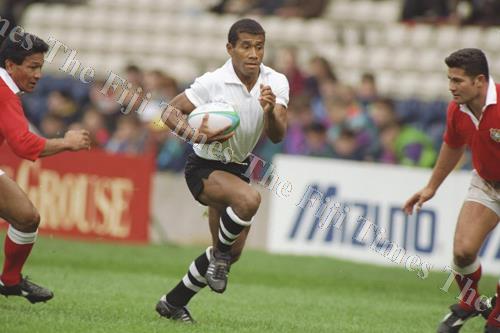THERE is only one name synonymous with rugby sevens.
The one and the only, Waisale Serevi.
He is the undisputed king of the abbreviated code — there is none like him — and some have even dared to say we will never see another with the like of Serevi ever again.
Rugby pundits the world over have christened him “Maestro” and the greatest commentators and fans across the globe have acknowledged one fact — Serevi took the sport to a new level when he entered the international 7s scene at the 1989 Hong Kong 7s.
In short, Serevi has etched his name in the shortened code history books as the greatest 7s player that ever lived.
He is the only player in Rugby Sevens World Cup history to lift the Melrose Cup twice as a captain — and he has played in four consecutive rugby 7s world cups (1993, 1997, 2001, 2005).
When it comes to Serevi’s contribution to rugby 7s, his accomplishments are well known to many.
And we could fill this newspaper with his outstanding achievements, especially during the four rugby 7s world cups he had played in. We spoke to two of Serevi’s rugby world cup teammates as they shared their thoughts about the Maestro.
Serevi made his 7s debut for Fiji at 20 at his favourite hunting ground in Hong Kong and appeared in his first rugby world cup in Scotland in 1993.
He showed uncanny skills and foresight backed by his two late rugby uncles in 1993 captain Vesi Rauluni and brother Vili.
Playing alongside the trio in that 1993 Fiji team was tough Nadi forward Penisoni Waki.
Waki said Serevi was known as the team’s saviour.
He said when Fiji ran out of options in attack they always gave the ball to Serevi and he always bailed them out of trouble.
“He was our master mover, a starter, a finisher and the team’s saviour,” Waki recalled.
“In our time we mostly used ‘scissors passing’ mainly to confuse our opponents — but when the going gets tough or when our opponents read our game – we used to pass the ball to Serevi to start a new move.
“He would dictate play, start a new phase of play and almost always finished all our attacks with a try.
“We always protected Serevi, we didn’t want him to get hurt because he controlled our game.”
Serevi’s 2005 winning world cup teammate Viliame Satala echoed similar sentiments. Satala, who played club rugby in France, England and went on to represent the World 15s Barbarians, said “there will be no other player like Serevi”.
“His presence alone on the field always worried our opponents,” Satala shared.
“He was a great leader who led by example, a gifted rugby player and he will never be forgotten in the history of the 7s game.
“Even now, though he has retired, players these days still copy his techniques.”
Below are excerpts of Serevi’s interview with Rugby Sevens World after the 1993 rugby world cup win.
Waisale Serevi (Fiji): “Sevens is part of every Fijian rugby player’s life and the Rugby World Cup Sevens means a lot to me and the people of Fiji. We played well and then we played in the final against South Africa, who had won the Rugby World Cup in South Africa two years before in 1995 and were coming to Hong Kong with all their top players – van der Westhuizen, Skinstad, Venter and Rossouw – they really wanted to win the World Cup in sevens too.
“I can remember warming up, though, and seeing the crowd and one of the Fiji supporters had a sign saying ‘Take it home Fiji’ and I said to the boys, ‘Look, you have to play like this is the last game of your lives and you’ll never play rugby again. This is an opportunity for you to get on the field and do something for your country’.
“In the final they scored two tries and under the posts I said to the boys that we needed to get the ball, and we needed to score a try before half-time. Then they lost the ball, we scored and came back into it and won.
“Winning that little cup was huge for people in Fiji.”
The 7s legend is also the Rugby World Cup Sevens all-time highest points scorer with 297 and all-time second highest top try scorer with 23 tries behind his Fijian teammate and fellow Gau native Marika Vunibaka. Without a doubt, Serevi is a legend and even the most seasoned rugby commentators ran out of words in trying to best describe the legend.
You will hear more of the 7s legend later in our Rugby Sevens World Cup coverage.
*This 2018 World Cup 7s build-up coverage is brought to you by Fiji Gas




